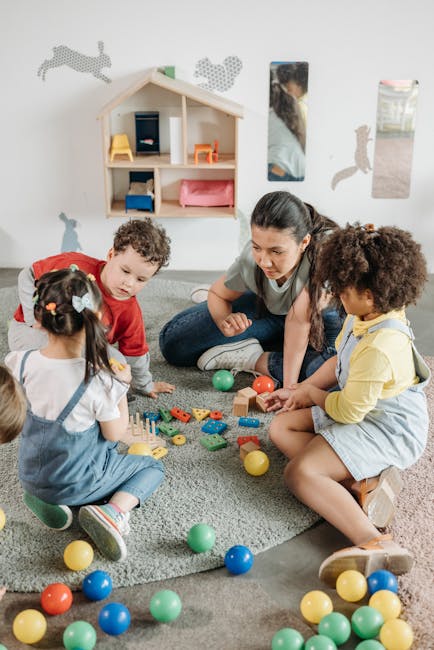How to Choose the Right Educational Toys for Your Child
As a parent, you always want the best for your child, and that includes their toys. Educational toys are a fantastic way to nurture your child’s development while keeping them entertained. But with so many options on the market, how do you choose the right educational toys for your child?
In this guide, we’ll explore the factors you should consider when selecting educational toys, the benefits they offer, and some popular options to help you make an informed decision.
The Importance of Educational Toys
Educational toys play a crucial role in child development. They help children develop essential skills such as cognitive abilities, motor skills, social interaction, and emotional growth. According to a study by the American Academy of Pediatrics, play is essential to healthy brain development.
Cognitive Development
Educational toys such as puzzles, building blocks, and board games help children develop problem-solving skills, spatial awareness, and critical thinking. These toys challenge their minds and encourage them to think creatively.
Motor Skills
Fine motor skills and hand-eye coordination are crucial for a child’s overall development. Toys like shape sorters, stacking toys, and art supplies help improve these skills by requiring precise movements.
Social Interaction
Playing with educational toys often involves group activities, which help children learn how to share, take turns, and communicate effectively with others. This is particularly important for developing social skills and building friendships.
Emotional Growth
Educational toys can also contribute to emotional development by teaching children patience, perseverance, and how to cope with frustration. For example, completing a challenging puzzle can give a child a sense of accomplishment and boost their self-esteem.
Factors to Consider When Choosing Educational Toys
When selecting educational toys for your child, there are several factors to consider to ensure you choose the right ones. Here are some key points to keep in mind:
Age Appropriateness
One of the most important factors to consider is whether the toy is suitable for your child’s age. Toys that are too advanced can lead to frustration, while toys that are too simple may not provide enough stimulation. Most educational toys come with age recommendations on the packaging to guide you.
Safety
Safety should always be a top priority when choosing toys for your child. Ensure the toys are made from non-toxic materials, have no small parts that could pose a choking hazard, and meet safety standards. The Consumer Product Safety Commission (CPSC) provides guidelines and recalls for unsafe toys.
Educational Value
Consider what skills or knowledge the toy will help your child develop. Look for toys that promote critical thinking, creativity, and problem-solving. For example, STEM (Science, Technology, Engineering, and Mathematics) toys are excellent for fostering a love of learning in these subjects.
Interests and Preferences
Choose toys that align with your child’s interests and preferences. If your child loves animals, consider animal-themed puzzles or interactive animal toys. Tailoring the toys to their interests will keep them engaged and motivated to learn.
Durability and Quality
High-quality toys are more likely to withstand the wear and tear of playtime. Look for toys made from durable materials that can last through multiple uses. This not only ensures safety but also provides better value for your investment.
Popular Educational Toys by Age Group
To help you narrow down your options, here are some popular educational toys categorized by age group:
Infants (0-12 Months)
For infants, look for toys that stimulate their senses and encourage exploration. Recommended toys include:
- Soft, colorful rattles
- Teething toys
- Cloth books with different textures
- Activity gyms with hanging toys
Toddlers (1-3 Years)
Toddlers are curious and eager to learn. Consider toys that promote motor skills and basic problem-solving:
- Shape sorters
- Stacking rings
- Building blocks
- Simple puzzles
Preschoolers (3-5 Years)
Preschoolers are developing more complex cognitive and social skills. Look for toys that encourage creativity and cooperative play:
- Arts and crafts kits
- Pretend play sets (kitchen, doctor kits)
- Board games
- Interactive storybooks
School-Age Children (6+ Years)
School-age children benefit from toys that challenge their intellect and creativity. Recommended toys include:
- STEM kits (robotics, science experiments)
- Advanced puzzles
- Strategy board games
- Musical instruments
Actionable Tips for Choosing the Right Educational Toys
Here are some actionable tips to help you choose the best educational toys for your child:
Observe Your Child’s Play
Take note of what types of toys and activities your child naturally gravitates toward. This can give you insight into their interests and help you choose toys that will keep them engaged.
Read Reviews and Recommendations
Before purchasing a toy, read reviews from other parents and experts. Websites like Common Sense Media provide detailed reviews on educational toys, helping you make an informed decision.
Rotate Toys Regularly
To keep your child engaged and prevent boredom, rotate their toys regularly. Introducing new toys or reintroducing old ones can keep playtime exciting and stimulating.
Engage in Play with Your Child
Playing with your child not only strengthens your bond but also enhances the educational value of the toys. Take the time to explore the toys together and guide your child through new challenges and activities.
Conclusion
Choosing the right educational toys for your child can have a significant impact on their development and learning journey. By considering factors such as age appropriateness, safety, educational value, and your child’s interests, you can select toys that provide both fun and learning opportunities.
Remember, the best educational toys are those that engage your child’s curiosity, challenge their minds, and encourage them to explore the world around them. Happy toy hunting!
